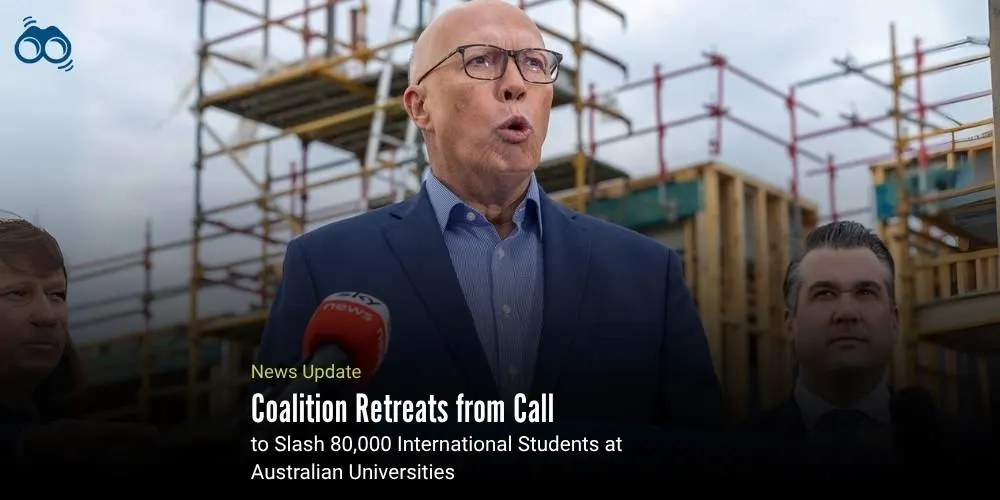Australia’s Coalition Revises International Education Strategy in Wake of Public Criticism
Opposition Signals Shift to Collaborative Approach on Higher Education Policy
Australia’s international education sector has long been a pillar of its global reputation and economic vitality. However, in the lead-up to the May federal election, it became a focal point in political debates surrounding housing, migration, and national priorities. The Coalition proposed a contentious plan to reduce international student numbers by 80,000, arguing that such a measure would alleviate pressure on housing and rental markets. Then-opposition leader Peter Dutton claimed that international students were occupying accommodation intended for Australian citizens, a stance that drew widespread criticism from the higher education sector. Tertiary bodies condemned the proposal as “isolationist” and likened it to anti-migration rhetoric associated with former U.S. President Donald Trump.
Following the Coalition’s significant electoral defeat, the party has reportedly withdrawn the proposal. Speaking on ABC TV, the new education spokesperson, Senator Jonathon Duniam, acknowledged that the earlier policy lacked nuance and confirmed that the Coalition was now reviewing its platform. He emphasised that while universities should not treat international students merely as sources of revenue, many regional institutions depend heavily on international enrolments for financial stability. Duniam called for a more balanced and constructive dialogue, expressing a willingness to collaborate with both the education sector and the government.
Meanwhile, the Labour government is said to be planning a cap of 270,000 international student enrolments by 2025. The Coalition has also softened its stance on other education matters, including its previous opposition to Labour’s proposal to reduce HECS debts by 20%. Duniam acknowledged the election outcome, stating that Australians had “had their say” and that the party must now reassess its approach.
The Coalition’s broader education policies have also come under scrutiny. In his budget reply speech, Dutton pledged to “restore” a curriculum focused on “critical thinking, responsible citizenship, and common sense.” Although no detailed policy was released, he suggested that federal school funding could be linked to adherence to specific curriculum standards, rather than what he described as “university-driven agendas.” However, Duniam appeared to distance himself from this rhetoric, stating that his priority was to improve student outcomes in core subjects such as maths, reading, and science. He argued that strengthening these areas would naturally address other concerns, including those often labelled as “woke issues.”
The topic of gender in sports was also raised, with several Coalition members, including Senator Claire Chandler, continuing to advocate for banning transgender women from participating in women’s sports. When asked for his view, Duniam called for a respectful and mature debate. He maintained that girls’ and boys’ sports should remain distinct, while acknowledging that mixed competitions could be managed appropriately at the school level. He added that it was not his role to determine individual participation in sporting categories. Separately, shadow immigration minister Paul Scarr urged for a more respectful tone in migration discussions. In a June interview with The Guardian Australia, he highlighted the valuable contributions of migrants to Australian society and stressed that future debates should reflect this recognition. The Coalition’s revised stance signals a shift towards more measured and inclusive policymaking in education and migration.
Editor’s Note:
Australia’s international education sector plays an important role in connecting the country with the world and supporting its economy and universities. Recent discussions around student numbers and migration have brought attention to how political decisions can affect education, housing, and community life. The Coalition’s earlier proposal to cut 80,000 international students raised concerns among many in the education sector, with experts warning that such a move could harm university funding, diversity, and Australia’s global reputation. After the federal election, the Coalition has now taken a softer approach, showing a willingness to listen and work with others. This shift is a positive step towards more thoughtful policymaking. It also reminds us that international students are not just visitors; they are part of our classrooms, communities, and future.
Skoobuzz highlights that as both government and opposition review their plans, it is important to keep the focus on fairness, collaboration, and long-term benefits for all Australians.














0 Comments (Please Login To Continue)